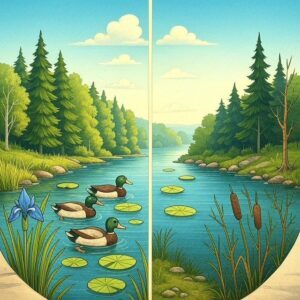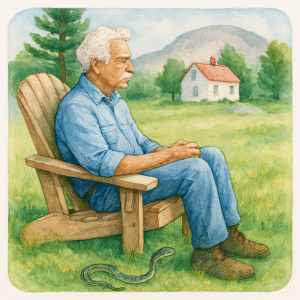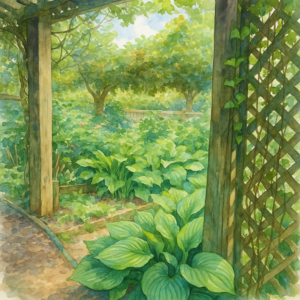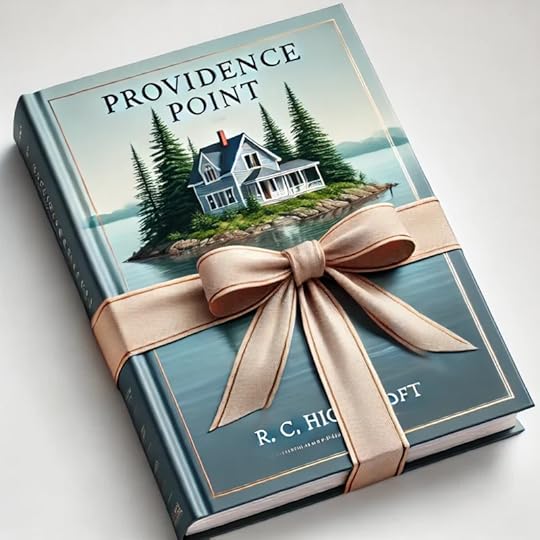R.C. Highcroft's Blog, page 3
May 3, 2025
Unintended Consequences (3 May)

Margaret Wheatley (Leadership and the New Science) warned us in the 1990s: “Probably the most visible example of unintended consequences is what happens every time humans try to change the natural ecology of a place.” Her view picks up on Adam Smith’s eighteenth-century concept of an “invisible hand” that may bring about results that bear no obvious resemblance to original intentions. Wheatly’s revival of that way of thinking casts light on the origins of modern nervousness over sustainability.
And in line with that understanding, the two sides of this graphic depict the subtle but inescapable workings of Samsara, our old friend from an earlier post. Followed from left to right, the visual story transitions from a scene of flourishing abundance to one that while still recognizable is in decline. The wild ducks have flown, and in addition the iris is no longer in bloom and the rushes have all but died. Worse still, the shoreline further back has evolved into a stony and less welcoming strip, and the forest is showing signs of bare branches. The basic setting does remain much the same each time but it’s not quite identical. Both stretches of water appear to invite us for a quiet paddle, yet on the right-hand side a good deal of the initial charm has slipped away. The deterioration is not night-and-day but it’s real, and that’s the point. A thoroughly blatant contrast would be too simple… Samsara takes us in by keeping things ‘good enough’ but never ‘just right.’ Such is the “almost if not quite perfectly untarnished realm” invoked on the back cover of the novel.
Most readers will have their own recollections of enchanting yet precarious scenarios. Georgian Bay’s splendid but fragile landscape ranks high among mine. After all, premonitions of an actual or impending downturn all too often point to reality. If you agree, add a remark or two in the comment section. And delve into Providence Point to sojourn page after page in a delectable world of undoubted if volatile beauty.
(Illustration generated by AI)
April 24, 2025
A New Word and a New Experience (March 24)

The word gigil (sounds like ghee-gill) is a term from the Philippines’ Tagalog language, recently added to the Oxford English Dictionary. It refers to an intense feeling that makes us clench our hands, grit our teeth, or reach out to touch something that is irresistibly adorable. Gigil seems to be the perfect word to describe Robbie’s experience when he and his uncle are adrift after an evening’s fishing in a secluded bay. The adult suggests waiting a bit before departing for home.
“Let’s sit for a while.” Soon a bird called quietly from somewhere in the reeds. “What’s that, Uncle Harry?”
“It’s a loon with its baby.” The piping note was nothing like the wild yodels we heard after dark. This was something else to file away…
… “Look into the chinks between the reeds. Do you see anything moving?”
Gradually, a flickering profile took shape, but by then the stealthy parent must have sensed our attention. The calls grew even fainter. We watched and listened until the outline and the sound were completely gone. At length my uncle reached back for the outboard motor…
… He brought us out onto open water. The boat picked up speed and carried us back to the more predictable if less instructive comforts of the veranda at the Point. But I brought along a new way of fathoming the world around me. (Providence Point, p. 149)
(Illustration generated by AI)
April 20, 2025
No Eden without a Serpent (April 22)

On p. 87 of Providence Point, Bella tells Robbie about her uncle …
“Soon, the Major’s creditors will be able to do as they please… They’ve been after the meadow for ages and he isn’t rich any more.”
“But could he live anywhere else?”
“Of course not. Still, can you guess what he says?” I waited for her to tell me. “He says there’s no Eden without a serpent.”
Bella’s words echoed in my mind all the way home. When I arrived, my grandparents were back from Port. They were drinking tea and gazing over the water. I sat down and chose a biscuit from Granny’s box. Nibbling it slowly allowed me not to share my adventure right away. At length I told them about Bella and the picnic. But I kept back what she said about the meadow. I did not have the heart to hear that part again, even in the safety of the veranda.
The Major’s comment calls up an insight known in the Buddhist teachings as Samsara: the cyclical ebb and flow of serenity that may briefly feel almost ideal but is never entirely reliable. And his grasp of life’s shortcomings comes at least close to the Dalai Lama’s wise advice:
According to Buddhist practice, there are three stages… The initial stage is to reduce attachment towards life. The second is the elimination of attachment to this Samsara. Then in the third stage, self-cherishing is eliminated.
Honest reflection is sure to remind us of magically-appealing-but-not-quite-perfect moments. For instance, my own career around the world introduced numerous new settings that too often proved to deliver just a tad less satisfactoriness than initially met the eye. Instead of chafing against those regrets, the Major knew that the savviest course was to take them in stride. Of course, that’s not to say that everyone will attain his level of tranquility!
Have you as well encountered such challenges? Perhaps you’d be willing to leave a comment with one or two examples.
(Illustration generated by AI)
April 14, 2025
My Writing Room: 14 April, 2025
 After decades abroad, I settled near southern Ontario’s Lake Erie to create my own tribute to haunts I had enjoyed in England, Provence, Morocco, and Persia. My goal was to bring together the lushness of a cottage garden, the harmony of a symmetrical parterre, and the mystery of a reflecting pool, all nestled within the seclusion of a secret retreat enclosed by hedges and walls. And weather permitting, the central arbour became my favourite writing room.
After decades abroad, I settled near southern Ontario’s Lake Erie to create my own tribute to haunts I had enjoyed in England, Provence, Morocco, and Persia. My goal was to bring together the lushness of a cottage garden, the harmony of a symmetrical parterre, and the mystery of a reflecting pool, all nestled within the seclusion of a secret retreat enclosed by hedges and walls. And weather permitting, the central arbour became my favourite writing room.
Even during snowy winter, the view over that setting opened up an irresistible vista before my indoor desk. And from early spring onwards, an unlatched window welcomed birdsong to stream in on a beam of flickering sunshine. Like all well-planned gardens it was not only vividly itself, but also a cheerful memento of so many other settings that would never vanish entirely from memory.
That kind of indelible recollection permeates each chapter of Providence Point. And writing beneath that arbour, or simply within sight of it, was an irreplaceable strategy for recovering the memories that make every episode in the novel sing.
Possibly there are places with similarly powerful associations for you, too. If so, take your opportunity to revive their echo while reading Providence Point. Also, perhaps leave a record of them as a comment below.
(Illustration generated by AI)
April 10, 2025
Yellow Irises (April 10, 2025)
 Young Robbie recalls that on his fifth birthday … “I received a lithesome steel fishing rod of my own. In my hands, it felt robust yet unexpectedly precise. I hastened to test it on the sunfish under the dock. Though nothing I caught that day found its way to the table, I received a different kind of reward. My new trophy was enameled in brilliant yellow. Until then the only metal rods I had seen were prosaic black. Granny observed that this one perfectly matched the water irises along the shore. Yellow irises were less common in Ontario then than now, so Granny prized them especially. They reminded her of others near her childhood village in England. Flourishing beds had festooned a chalk stream where her father often fished. That link explained my affection for a gift I kept with me for many years. And the nesting of one Russian-doll memory within another came as no surprise to my grandmother or myself. It was a simple fact of life.” (Providence Point, p. 2)
Young Robbie recalls that on his fifth birthday … “I received a lithesome steel fishing rod of my own. In my hands, it felt robust yet unexpectedly precise. I hastened to test it on the sunfish under the dock. Though nothing I caught that day found its way to the table, I received a different kind of reward. My new trophy was enameled in brilliant yellow. Until then the only metal rods I had seen were prosaic black. Granny observed that this one perfectly matched the water irises along the shore. Yellow irises were less common in Ontario then than now, so Granny prized them especially. They reminded her of others near her childhood village in England. Flourishing beds had festooned a chalk stream where her father often fished. That link explained my affection for a gift I kept with me for many years. And the nesting of one Russian-doll memory within another came as no surprise to my grandmother or myself. It was a simple fact of life.” (Providence Point, p. 2)
That Russian-doll metaphor taps into a celebration of deep-seated continuities that recurs in one form or another throughout Providence Point. As always, new encounters delight us not only for the surprises they bring, but also because they are mysteriously the same.
Buildings, landscapes, artifacts, or pastimes … in a well-lived life the charm of variety blooms vigorously from the rich loam of meaningful coherence. In my own case, examples would include recalling but then adapting recipes handed down from earlier generations. Gardening in the spirit if not precisely the same style as a mentor. Or building a library of classic books with ample room for new favourites as well.
But what about you? If this pattern makes sense, by all means leave a comment with additional instances that come to your mind.
And if you’d like to read more, find your preferred hardcover, paperback, or Kindle edition of Providence Point via the links on the About the Book page.
(Illustration generated by AI)
March 31, 2025
Why keep the chapters short? (March 31, 2025)

“Reading in bed jumpstarts dreams.” – Terri Guillemets was right to include this motto on her ‘Quote Garden’ website. And in that spirit, Providence Point features chapters that are often just several pages long. After an exhausting day, one peek into their magical world is enough to deliver peace of mind ahead of a great night’s sleep.
Likewise, such bite-sized chapters are ideal for readers commuting to or from work. Even a brief look-in on the characters and scenes of this novel can provide the ideal escape from daily pressures.
Imagine reading on from first lines like “For Granny, living well meant bringing order to what might otherwise be chaos…” (p. 23), “Grand-père Évariste Leduc’s house stood on a granite ridge with a view over the Bay…” (p. 58), or “That September’s weather began as bright as in the best of years…” (p. 260).
Ready for more? Find your preferred hardcover, paperback, or Kindle edition of Providence Point via the links on the About the Book page.
But first, why not share one or two of your own recommendations for bedtime or on-the-go reading?
February 4, 2025
Providence Point (February 4, 2025)
 “A book,” Garrison Keillor supposedly declared, “is a gift you can open again and again.” He may (or may not!) have said so on one of his Prairie Home Companion shows, but the picky details hardly matter. The main thing is that he hit the nail on the head.
“A book,” Garrison Keillor supposedly declared, “is a gift you can open again and again.” He may (or may not!) have said so on one of his Prairie Home Companion shows, but the picky details hardly matter. The main thing is that he hit the nail on the head.
Every dyed-in-the-wool reader can name a few favourites that never grow old. They need not be numerous for their importance to last a lifetime. My own catalogue includes John Moore’s Brensham Trilogy, Robert Ruark’s The Old Man and the Boy, the short stories of Mavis Gallant, and the poems of A. E. Houseman, Gerard Manley Hopkins, and Robert Frost.
So, yes indeed, Keillor got it right. I reopen those volumes again and again. What’s more, my money says that you treasure your own list, too. By all means share one or two titles in a reply to this post.
And here’s another idea. Check out Providence Point wherever you buy your novels. I daresay it’ll earn its place alongside the books you already turn to time after time.



